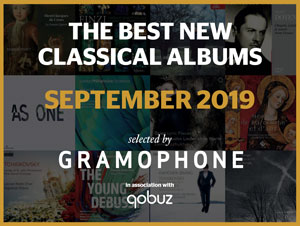Handel: Rodelinda at Garsington | Live Review
Andrew Green
Monday, June 16, 2025
Peter Whelan‘s energetic yet unfailingly sensitive direction of the English Concert was well-calibrated in every last measure
⭐⭐⭐⭐

Rodelinda at Garsington Opera (Photo: Julian Guidera)
Rodelinda, a tale of dark political/romantic intrigue in Lombardian court circles, was an instant success in February 1725 at The King’s Theatre in London’s Haymarket (Handel’s fellow-Hanoverian George I brought the family to a 1726 performance). However, apart from a few individual numbers the score lay essentially neglected for long years until the modern era brought the acclaim this fabulous score merits. The English Concert’s recording (with Lucy Crowe a marvellous Rodelinda) has played its part in affirming the work’s qualities, which shone through the orchestra’s vibrant contribution (Peter Whelan conducting) to Garsington Opera’s celebration of Rodelinda’s tercentenary.
This intriguing new production had a hard act to follow after the wonders of Tchaikovsky’s Queen of Spades, one of the most imaginative, visually stunning and dramatically intense offerings of recent Garsington seasons. For Rodelinda, designer Leslie Travers provides an upstairs-downstairs, ‘split-screen’ affair, with much of the action transferred to a gallery (framed by what resemble steel girders) above the stage, On that stage, large movable platforms allow for a variety of reconfigurations of the space - most dramatically so at the start of Act 2 when a large serving area decked out in place-settings (and, yes, pig carcasses…doubtless weighted with symbolism) advances threateningly into centre-stage. Opinions will inevitably vary as to how successful these conceptions are. Some striking contemporary set designs - Garsington’s remarkable 2022 Monteverdi Orfeo a case in point - manage to embrace centuries-old music effortlessly. In the case of this Rodelinda, perhaps not.
Beyond the set, the most remarkable spectacle, throughout much of the production, is the presence of a dozen dancers in sternly tied-back hair and sporting what resemble cassocks, in threatening black. The dancers’ dual role lies firstly in reflecting and supporting the emotion flying around from scene to scene (with all manner of meaning-rich shaping and movement), while also they actively participate in the drama, whether brandishing swords or effecting arrests. This hauntingly effective conception, courtesy of movement director Rebecca Meltzer, is not only a striking element in terms of mood and spectacle, but also serves as a unifying ingredient to the opera’s wide arc, thereby softening the relentlessness of the recit/aria framework.


Rodelinda at Garsington Opera (Photo: Julian Guidera)
Speaking in advance of the production, director Ruth Knight noted how satisfyingly rounded as human beings are all the characters in Rodelinda. Quite so, although decking out the devious usurper Grimoaldo (Ed Lyon) in caricaturesque camp regalia perhaps militated against that idea. Knight also spoke of Rodelinda’s extraordinary strength of character, in facing - and defying - the most desperate circumstances, forced to cope with the fall-out from her husband Bertarido’s (apparent) demise, not least in the shape of the traitorous Grimoaldo’s advances. This feminist dimension, as Knight views it, is emphasised via the manner in which for most of the opera Rodelinda (the afore-mentioned Lucy Crowe) sports shiny gold trousers; she also displays impressive swordplay skills, not least when (contrary to the original) she is the one who runs through the dastardly schemer Garibaldo (Brandon Cedel) as the opera’s conclusion looms. Not everyone will agree that Handel’s already finely drawn Rodelinda needs such under-scoring, but this pair of eyes had no problem with it, not least as Lucy Crowe utterly inhabits the role and its music. This hugely demanding part requires immense stamina and the technical ability to cope with occasionally extreme coloratura demands, which were managed so deftly and artistically as to banish any impression of showiness.
The other stand-out voice was that of Brandon Cedel, whose granite-like solidity will command spaces much larger than this auditorium. The two countertenor (originally castrato) roles provided the opportunity for compare-and-contrast. Tim Mead (Bertarido) possessed both vocal and dramatic intensity but not always complete security of pitch in slower music. Meanwhile, Hugh Cutting (as Bertarido’s sidekick Unulfo) offered less outright vocal projection but displayed a pleasingly rounded sound and a technique totally under control even at breakneck speed. The contributions of Ed Lyon and Marvic Monreal (Bertarido’s daughter Eduige) may have been left until last here, but this is not to underplay their accomplished performances.
Peter Whelan‘s energetic yet unfailingly sensitive direction of the English Concert was well-calibrated in every last measure. The abiding impression is one of yet more confirmation of the genius residing in vast quantities of Handel’s music…his creative imagination so fertile, so unfailing. Do we value him enough?
Until 19 July garsingtonopera.org









